It begins with us
By Maddy Alewine, Communications Specialist
The results of the 2018 midterms are usually described in superlatives. The 2019 congressional freshman class is the most racially diverse and the most female
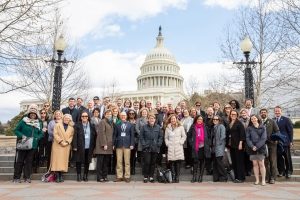
Partial group photo at Capitol Hill
group ever elected to the House. From the first Native American Congresswomen and the first Muslim Congresswomen to the most number of veterans, one of the largest freshman congressional classes is bringing a lot of diverse voices to the table. Last week, hundreds of Habitat for Humanity homeowners, volunteers, board members, and staff descended on Washington D.C. for the annual Habitat on the Hill (HOTH), to meet with this class of firsts and the hundreds of other legislators that represent our states.
Habitat also had a first. With over 350 attendees from 38 states and D.C., this was the largest Habitat on the Hill to date. Habitat representatives from Maine to Hawaii filled the conference room at the Omni Shoreham Hotel in D.C., and Asheville was in attendance- myself, Homeowner Selection Specialist and Habitat homeowner Shannon Kauffman, and former Board chair David Whilden.
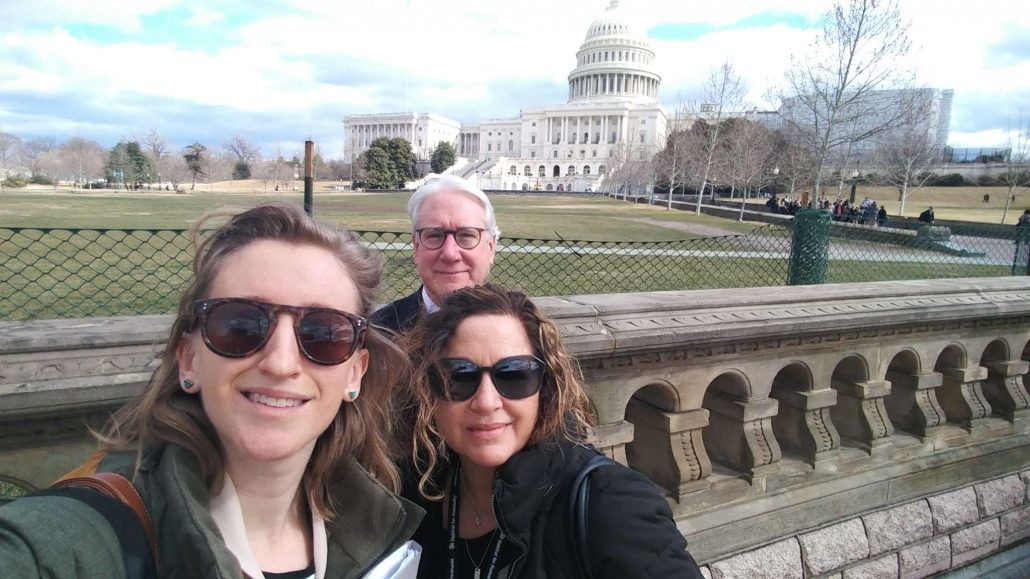
[From left] Maddy, Shannon, and David
The whole time there was this sense of urgency that flowed between all of us, enforced by the fact that so many of us felt it important enough to travel from so far to D.C. (I see you, Hawaii) and devote time away from our usual tasks to become better advocates. The simple truth is this: Habitat for Humanity can no longer just build houses. That’s just not who we, as an organization, are anymore- we’re more than that. Advocating for affordable housing policies has to become a part of every Habitat affiliate’s DNA in order to a) be able to continue building and repairing affordable homes despite the rising cost of building and housing and b) advocate for policies so people don’t have to need Habitat to have a decent, affordable place to live.
In our day of training, author Richard Rothstein who wrote The Color of Law, spoke to the crowd about the history of how our government at the local, state and federal levels segregated housing. The harsh reality is that black homeownerhsip is at the same level as when the Fair Housing Act was passed in 1968. Fifty-one years and it hasn’t changed. We cannot talk about affordable housing solutions without the undeniable truth that unconstitutional housing policy did and still does leave people of color, particularly black communities, far behind in the ability to accumulate wealth and have a decent place to live. We all have a responsibility to remedy this.
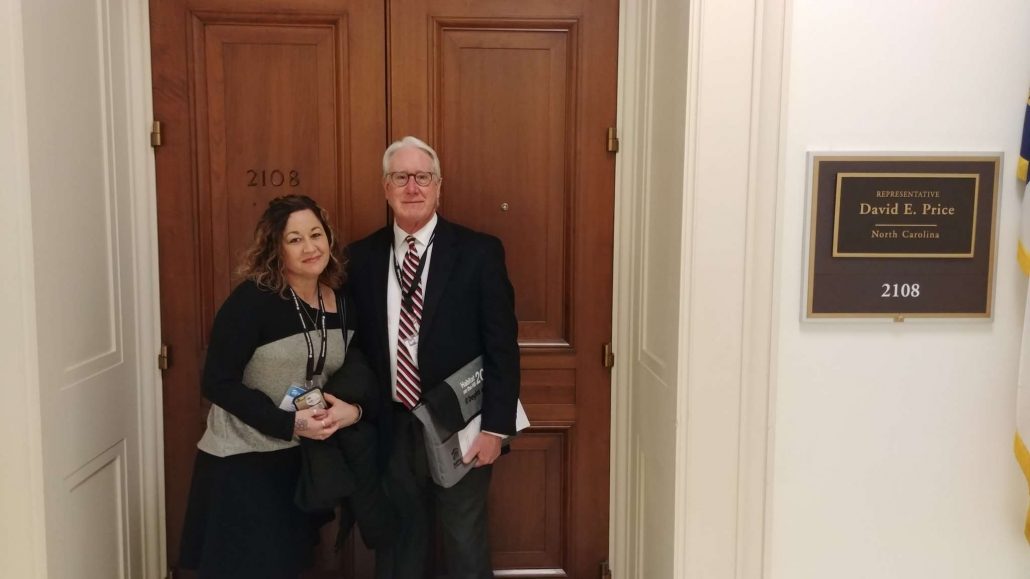
Shannon and David outside Rep. David Price’s office after greeting his staff.
The next day armed with knowledge, our local stories, and specific policy asks, David, Shannon and I put on our best walking shoes and trudged around the Senate and House buildings to meet with our elected officials. While we did not have a scheduled meeting with Rep. Mark Meadows, while getting slightly lost on our way to drop off materials at his office, we ran into the Congressman and spoke for a minute. He seemed genuinely pleased we had come from Asheville to bring housing concerns of Western NC to the Capitol. We also stopped in the office of Rep. David Price. Although not our district, this NC Congressman chairs the Transportation, Housing and Urban Development Appropriations Subcommittee.
For our next stop, we teamed up with about 15 fellow North Carolinians from Habitats around the state to meet with a staff member of Sen. Burr. While meeting with a staff member seems less exciting than the actual elected official, legislators’ staff often have more in-depth knowledge about specific issues and are the ones discussing these with their respective Senator or Representative. Legislative Assistant Robert Sneeden asked questions and was engaged as homeowners shared how owning a home has empowered them, as eastern state Habitats talked about the need for disaster relief, the rising cost of housing, the importance of AmeriCorps and much more.
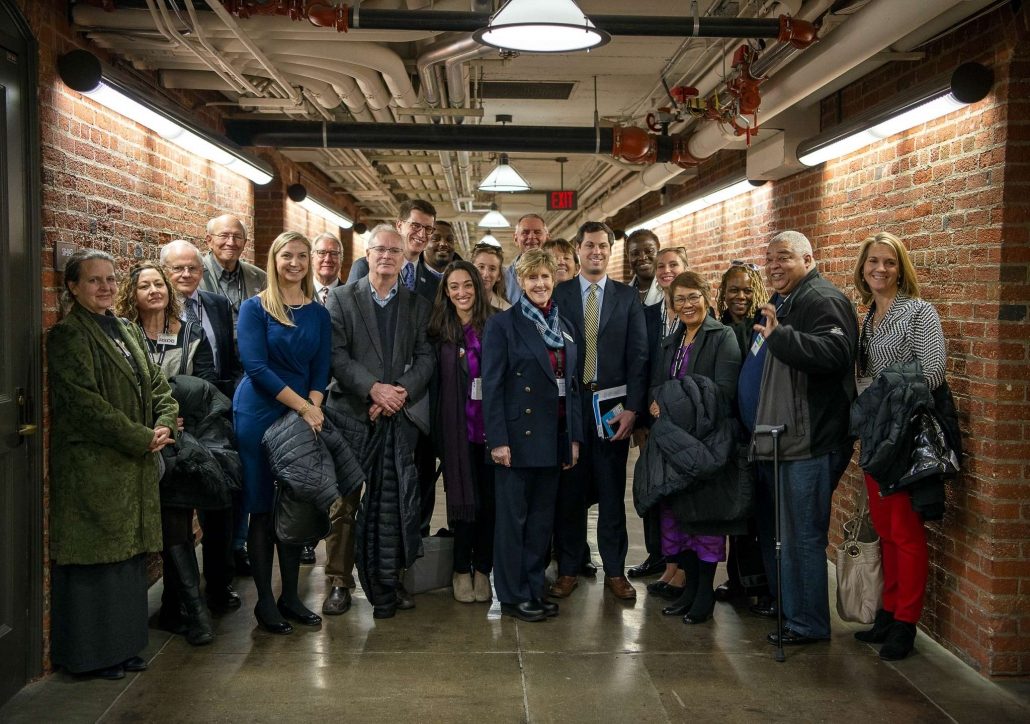
A group photo after our meeting with Sen. Burr’s Legislative Assistant Robert Sneeden.
A much smaller group- the three of us from Asheville, two from Charlotte and one staff member from Fayetteville- then ran (literally) back to the previous Senate building to meet with staff from Rep. Patrick McHenry. Meeting with Rep.
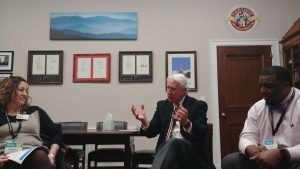
[Left to right] Shannon, David, and Brandon Price of Fayetteville Habitat in Rep. McHenry’s office.
It’s easy to be cynical about politics. I know I usually am. But something stuck with me that David Dworkin, President and CEO of the National Housing Conference said during our training. He said that yes, big money opens doors on Capitol Hill and that’s a fact. But, those money interests only lobby so hard as to compete with the power of all of our voices. As Asheville Habitat grows its ability to advocate more, we are alongside a network of thousands all across the country utilizing Habitat’s powerful voice- that reaches Republicans, Democrats, and everyone in between- with the message that
everyone deserves a decent place to live.

